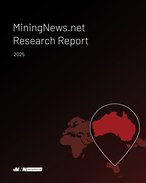This article is 7 years old. Images might not display.
It is a common lament from the supply sector. An equipment maker will come up with a device, take it to a miner and then get told: "That is fantastic but I want it exclusively for 20 years". Not a great way to advance technological development in mining, nor a great way forward for the miner.
The argument miners run is that technology advances they use provide a competitive advantage.
Therefore, they see it to be in their best interest to tie up control of that lest their competitors get it too.
For the small company that has developed the innovation the excitement of landing a big miner rapidly fades when management do the sums and realise they are not going to get anywhere near the profit they thought they would.
In some cases they end up walking away from the development, believing it has all become too hard.
So is it in the best interest of the industry to have miners trying to find and hoard technologies and innovations?
When MNN sister publication AMM ran a round table on innovation, intellectual property was one of the areas the participants touched on.
One example given was Fortescue Metals Group's involvement with the development of Caterpillar's autonomous haul truck solution.
With the system largely perfected at FMG's operations, Caterpillar is getting ready to roll it out a commercial version of it.
One school of thought was that FMG could argue that it owns a bit of the intellectual property for some of the technology. Should, therefore, Caterpillar be delivering a FMG version of the software because FMG had suggested many of the changes that had made the software more effective?
A better question may be, is that really the best way forward?
Austmine WA general manager Cameron Bowden told the AMM round table he had encountered similar problems when he worked for Rio Tinto.
"IP, I think with miners and suppliers - there will always be an ongoing issue," he said.
"How they deal with it, each to their own, but it can definitely stifle that innovation side of things."
Unearthed co-founder Zane Prickett, another of the AMM round table attendees argued it may not be in a miner's interest to own such IP.
Or, at least, not IP for everything in use on its site.
"The world's changing faster than ever," Prickett said.
"Technology is changing faster than ever.
"There's new and continuous improvements that are going faster than ever.
"So my opinion is the velocity in an organisation or in a company is what matters and so how do you optimise for a velocity, for a change, how do you incorporate new technologies, new techniques, new data standards, all that.
"That comes through your organisation faster and so I want to optimise for velocity. I won't usually optimise for IP.
"So, in general, I wouldn't be as worried about IP and want my outside organisations to be moving faster to keep up with me, so they can own their IP. They can drive it forward."
Prickett said with companies there were probably 100 challenges and probably only the top 10 were strategically important enough to the business to own the IP on.
He said one of the problems of trying to own the IP, particularly on something computer-driven, would be the need to continually maintain and upgrade that technology.
Global IO integrated operations specialist Stef Pienaar told the AMM roundtable this push by miners to own IP could be detrimental to both parties.
"To think that one company is going to sell all the products or come up with all the great features, I think might not be to the benefit of the entire industry," he said.
"Because, if you've got other mining companies using it they can, again, find different uses for it.
"They will spot things they can do better.
"For a mining company, surely IP is not the core business.
"So use the tool to do what you do best and let the whole industry improve the tool to improve it for the entire industry."
Mineralis Consultants' Peter Munro puts the matter even more bluntly.
"People don't make money out of IP in processing," he told the recent Metplant conference in Perth.
"They make money by processing the deposit."























